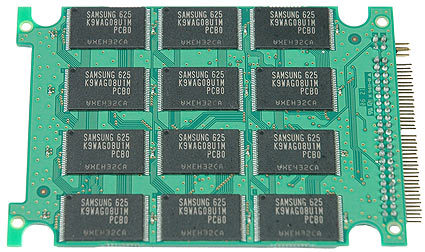Conventional Hard Drive Obsoletism? Samsung's 32 GB Flash Drive Previewed
Hard Drives Go Flash: Samsung Flash SSD
Flash memory may not replace hard drives any time soon, but it will be an alternative in certain market segments and complement hard drives in the main stream in few years from now.
If you follow the hard drive market, you are probably familiar with names such as Raptor, Deskstar or Barracuda, which stand for hard drive families from various manufacturers. All of today's mainstream hard drives are based on rotating magnetic platters, allowing for relatively high capacities of up to 750 GB per hard drive. But the technology has limits, as the data transfer speeds did not increase much over time. As a matter of fact, hard drives are the slowest components in modern PCs.
Most attempts to speed up storage performance either use caches to store data that is used frequently, or they deploy faster memory solutions such as SDRAM or DDR-SDRAM. However, all of these require the steady supply of energy by means of buffer batteries or by sucking power out of the grid. Solid state hard drives based on Flash memory are similar to SDRAM-based solutions, but they are unaffected by power-related volatility issues, which plague SDRAM units. Data that is written to Flash stays - even throughout power interruptions.
Flash hardware has intrinsic benefits, as it benefits from extremely short access times, but it also has specific advantages for the upcoming Windows Vista operating system. Flash memory as an optional cache allows the user to take advantage of Vista's "ReadyBoost" feature, allowing for a peppier PC. Adding Flash memory to a hard drive makes for a hybrid hard drive, which allows Vista to intelligently prioritize data according to frequently used applications and client schedule to cut down waiting times even further. The ideal solution is, however, a hard drive that is entirely based on an array of high performance Flash memory. The downside is that Flash memory is expensive, running at about $25/GB. We did not receive pricing information on the Samsung prototype that would help for consumer projection. As with all new hardware, Flash-based drives should continue to become more affordable as time goes on.
Join our discussion on this topic
Get Tom's Hardware's best news and in-depth reviews, straight to your inbox.
Current page: Hard Drives Go Flash: Samsung Flash SSD
Next Page Samsung Flash SSD Features And Specifications
